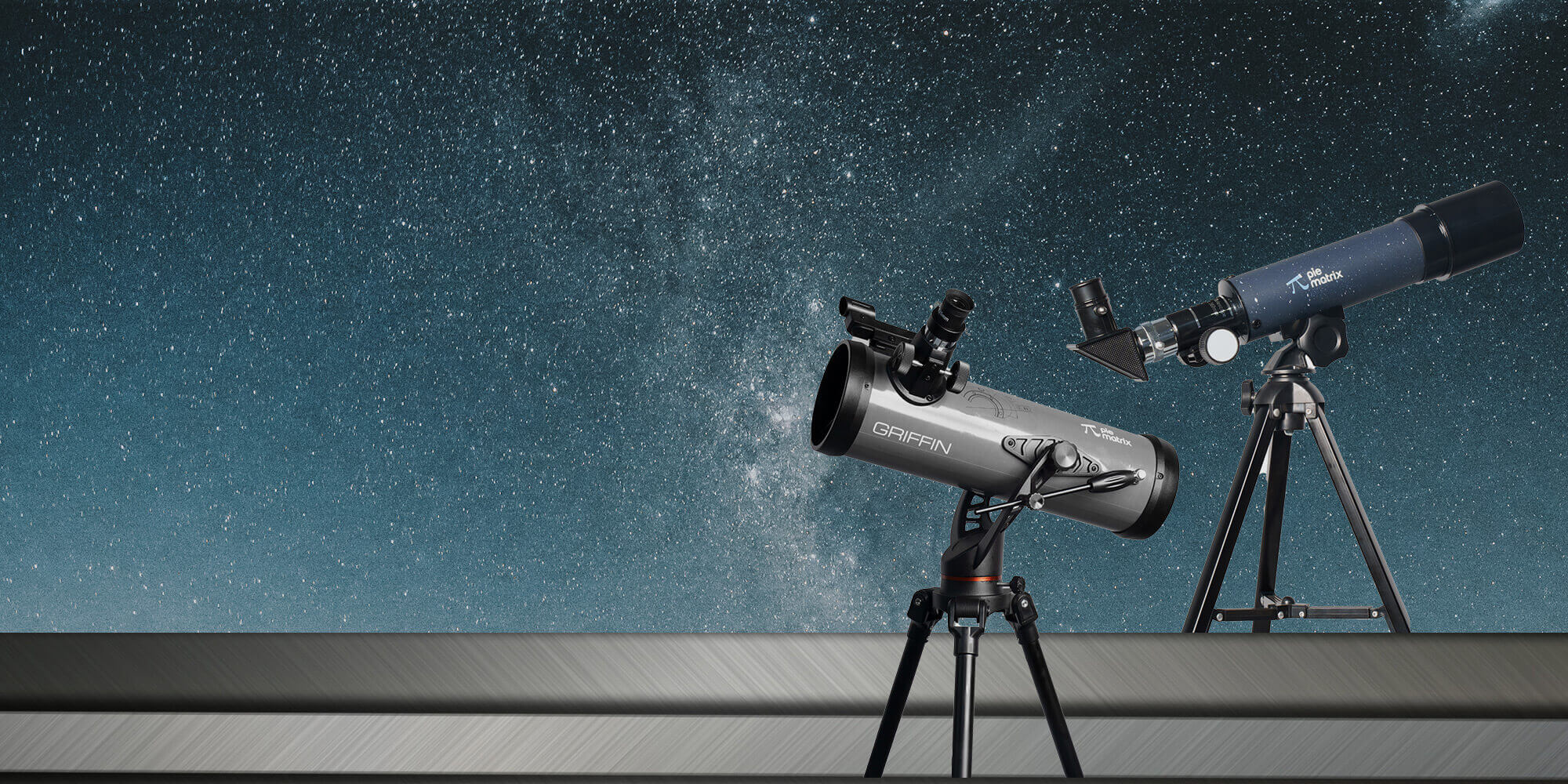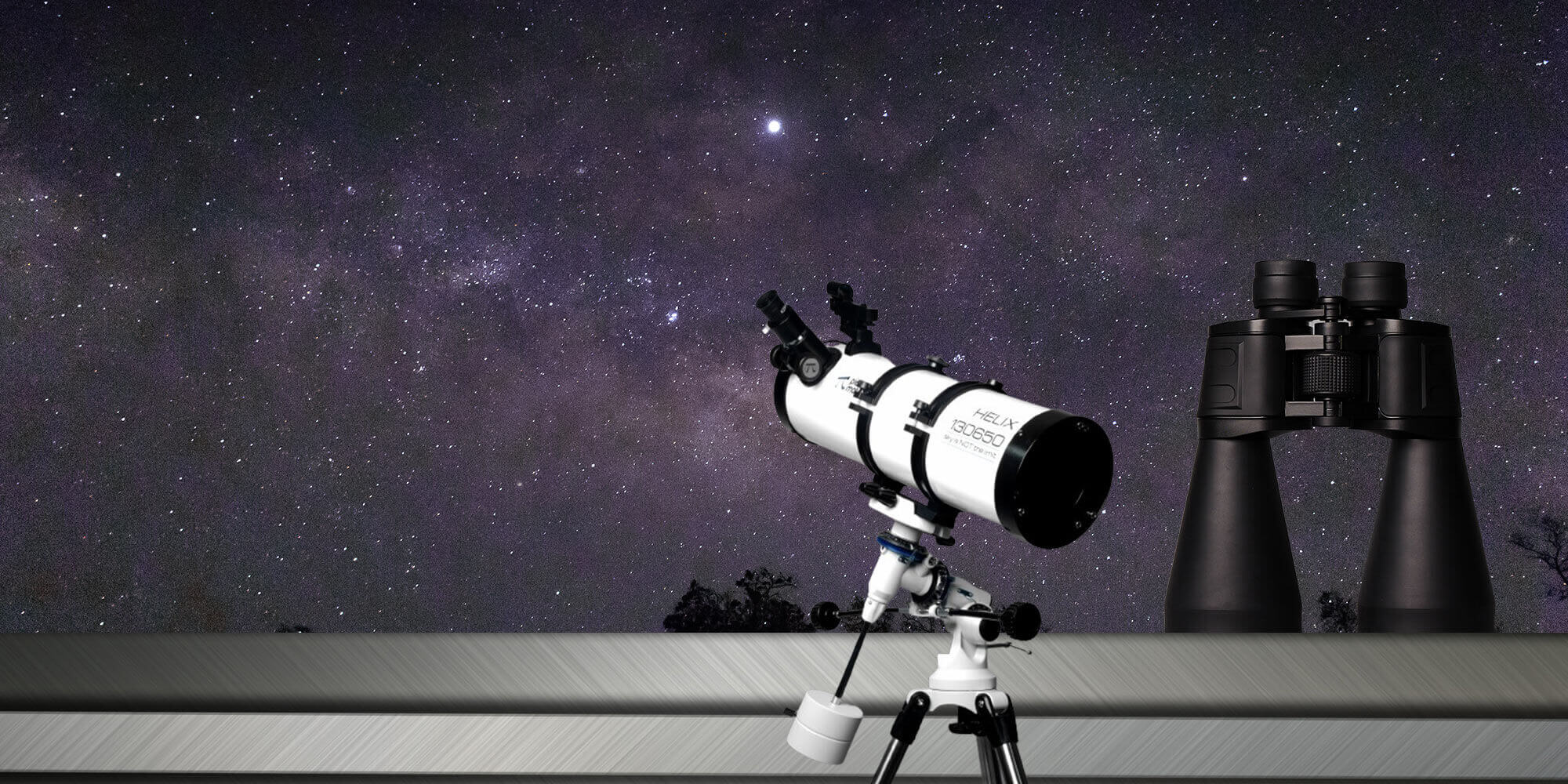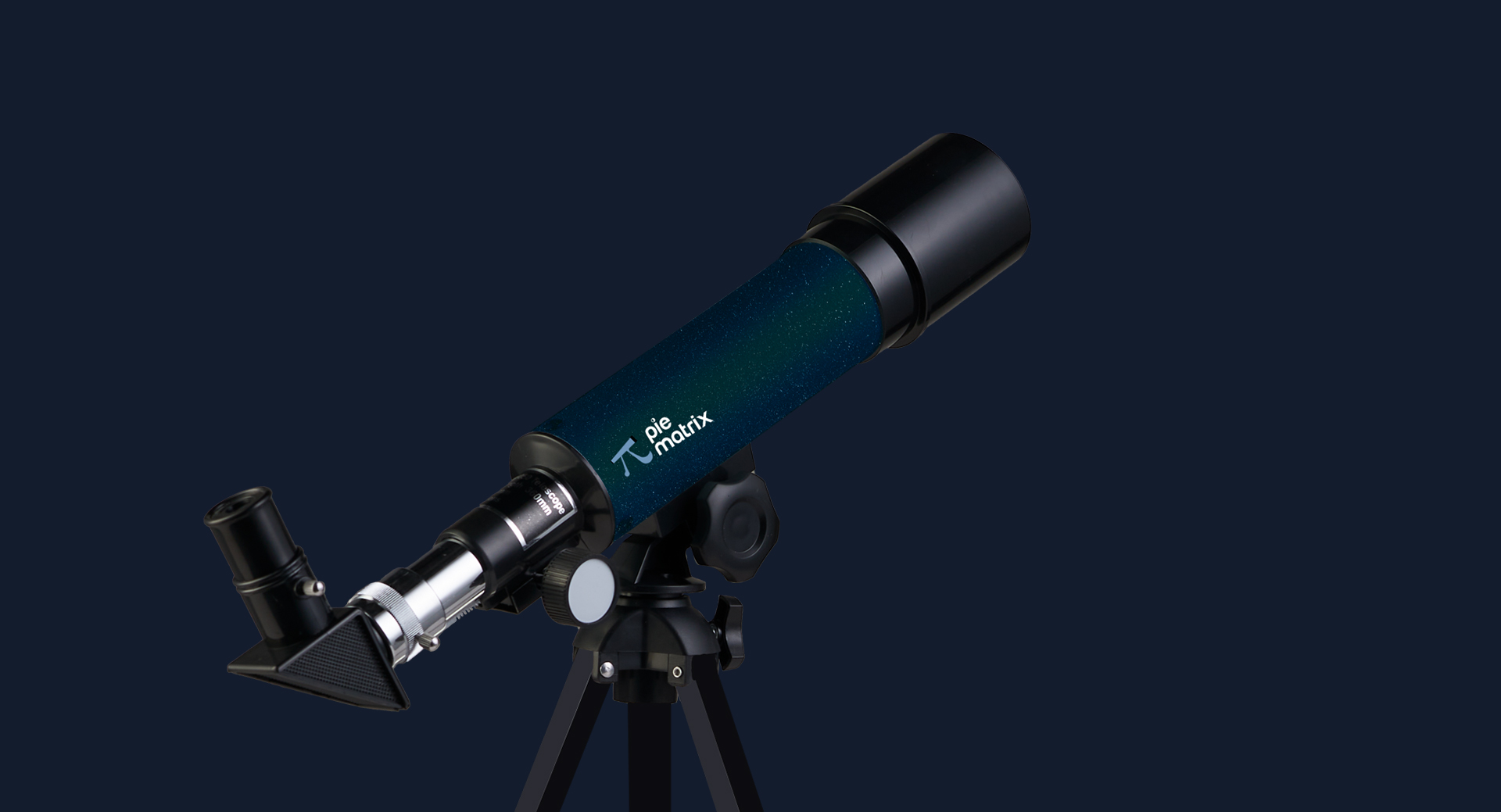Buy Telescope in Delhi from Pie Matrix
April 2024

Do the mysteries of the night sky captivate your imagination? Do you yearn to immerse yourself in the celestial beauty that Delhi’s clear skies have to offer? If so, investing in a telescope is an excellent decision. In this article, we will delve into the significance of telescopes, the various types available, the factors to consider before making a purchase, and where to find the finest telescopes in Delhi. We will also introduce Pie Matrix, a renowned destination for telescope enthusiasts. So, let’s embark on this cosmic journey together and discover the perfect telescope to satisfy your curiosity.
Introduction
The allure of gazing at the stars has always captivated humanity. The quest to unravel the secrets of the universe and witness its celestial wonders has led to the creation of telescopes. These remarkable optical instruments enable us to observe distant objects, such as planets, stars, and galaxies, with astonishing clarity. With advancements in technology, telescopes have become more accessible, allowing astronomy enthusiasts to indulge in stargazing from the comfort of their own homes. Delhi, with its growing interest in astronomy, provides numerous opportunities to purchase telescopes and explore the vastness of the cosmos.
Importance of Telescopes
Telescopes play a vital role in astronomy, granting us the ability to peer into the depths of space and witness awe-inspiring phenomena. They empower astronomers and hobbyists alike to observe celestial objects with intricate details and unravel the marvels of the universe. Whether you are a beginner or an experienced astronomer, owning a telescope can enrich your stargazing experience, providing a deeper connection with the cosmos and a sense of wonder that is truly breathtaking.

Types of Telescopes
When exploring the world of telescopes, it’s crucial to grasp the variety of options out there. The main categories include refracting telescopes and reflecting telescopes. Refracting telescopes use lenses to collect and concentrate light, while reflecting telescopes rely on mirrors. Each type has its own strengths and is best suited for different astronomical observations. Understanding these distinctions will empower you to make a well-informed choice when investing in a telescope.
Refracting Telescopes
Refracting telescopes are recognized for their traditional design, featuring a lengthy tube with a sizable objective lens at the front. These telescopes deliver crisp, high-contrast images, making them perfect for observing the Moon, planets, and binary stars. They are generally easy to maintain and are an excellent option for beginners.
Reflecting Telescopes
Reflecting telescopes, on the other hand, use mirrors to collect and focus light. They are celebrated for their versatility and are superb for observing faint deep-sky objects such as galaxies and nebulae. Reflecting telescopes often provide larger apertures at a more affordable price compared to refracting telescopes, which is why they are favored by astronomy enthusiasts.
Factors to Consider Before Buying a Telescope
When purchasing a telescope, it’s important to take several factors into account. To ensure you select the right one, consider the following aspects:
Aperture
The aperture refers to the diameter of the telescope’s primary lens or mirror. It dictates the telescope’s light-gathering ability, influencing the clarity and brightness of the observed objects. A larger aperture enables more detailed and vivid views of celestial bodies.
Focal Length
The focal length determines the magnification power of the telescope. Longer focal lengths offer higher magnification, ideal for observing planets and intricate details. Shorter focal lengths, on the other hand, provide wider fields of view, making them suitable for capturing expansive objects like galaxies.
Mount Type
Telescopes come with different mount types, such as alt-azimuth (AZ) and equatorial mounts (EQ). An alt-azimuth mount is user-friendly and great for casual stargazers, while an equatorial mount allows for precise tracking of celestial objects, making it the top choice for astrophotography and serious observing.
Portability
When choosing a telescope, think about how portable it needs to be, especially if you want to bring it to various locations. Smaller, lightweight telescopes are convenient to transport and set up, whereas larger ones may need a dedicated observing space.
Budget
Set your budget before delving into the world of telescopes. It’s important to find a balance between the features you want and the amount you’re willing to spend. Keep in mind, a high-quality telescope can offer years of stargazing pleasure.
Telescope Buying Guide
Now that you’ve got the basics down, let’s dive into the telescope buying guide. Whether you’re a newbie or a seasoned stargazer, this guide will help you choose the perfect telescope for your needs.
Step 1: Set Your Objectives
Before you buy a telescope, make sure you know what you want to achieve. Are you into planets, deep-sky objects, or both? Do you fancy astrophotography? Having clear goals will make it easier to pick the right telescope.
Step 2: Do Your Homework
Take the time to research different telescope models, brands, and customer feedback. Online forums, astronomy websites, and expert reviews can give you valuable insights into the performance and suitability of different telescopes.
Step 3: Explore a Nearby Shop
Head over to a nearby store that specializes in telescopes and astronomy gear. Engage with the friendly staff, ask any burning questions you have, and test out different telescopes if you can. This hands-on experience will deepen your knowledge of the equipment and assist you in making a well-informed decision.
Step 4: Delve into Accessories
Take a look at the accessories that are included with the telescope or that you may need to purchase separately. Eyepieces, filters, finder scopes, and tripods are some of the key accessories that can enhance your stargazing experience. Plan your budget accordingly for these items.
Step 5: Assess Your Viewing Environment
Consider your viewing environment, taking into account factors such as light pollution, available space, and weather conditions. These elements can impact your telescope choice. For city dwellers dealing with high light pollution, telescopes with larger apertures are recommended to gather more light and improve visibility.
Step 6: Consult with the Pros
If you’re feeling uncertain about which telescope to choose, seek advice from experienced astronomers or consider joining a local astronomy club. Seasoned stargazers can offer valuable insights, suggest options, and steer you towards the telescope that best suits your needs.
Best Places to Buy Telescopes in Delhi
Looking for the best place to buy telescopes in Delhi? Look no further than Pie Matrix! With their impressive selection of telescopes from trusted brands, Pie Matrix is a go-to destination for telescope enthusiasts. Their knowledgeable staff and commitment to customer satisfaction make the buying experience seamless and enjoyable. Discover the wonders of the universe with Pie Matrix!
Telescope Accessories
Consider adding these accessories to your telescope setup for an even better stargazing experience:
1. Eyepieces: With different focal lengths, eyepieces determine how close-up you can get with your telescope. Having a variety of eyepieces on hand lets you adjust to different viewing conditions.
2. Filters: Enhance contrast and visibility by using filters to reduce light pollution and bring out specific colors. These are especially handy when observing planets and nebulae.
3. Finderscopes: Quickly and accurately locate celestial objects with finderscopes that offer a wider field of view. They make navigating the night sky a breeze.
4. Tripods and Mounts: Keep your telescope steady and easy to use with sturdy tripods and mounts. Smoothly track celestial objects by choosing a tripod or mount that can support your telescope’s weight and is easy to transport.
Telescope Maintenance and Care
Taking care of your telescope is crucial to ensure it stays in top-notch condition. Here are some valuable tips to help you maintain its longevity:
1. Storage: Find a safe spot to store your telescope, away from any moisture or dust. Consider using protective covers or cases to shield it from accidental bumps and potential damage.
2. Cleaning: Keep your lenses or mirrors clean by using specialized cleaning tools. Remember to avoid touching the surfaces directly and carefully follow the manufacturer’s instructions for the best cleaning procedures.
3. Collimation: Optimal performance is achieved when the telescope’s optical elements are aligned. Periodically check and adjust the collimation, especially for reflecting telescopes, to guarantee sharp and clear images.
4. Battery Maintenance: If your telescope relies on batteries, make sure to replace or recharge them regularly. This will prevent any interruptions during your stargazing sessions and ensure uninterrupted enjoyment.
By following these maintenance and care tips, you’ll be able to enjoy your telescope for years to come, capturing breathtaking views of the cosmos.
Conclusion
Embark on an exciting journey of discovery and amazement by owning a telescope. Delhi boasts a lively astronomical community, offering fantastic chances to buy telescopes and enjoy stargazing. Learn about various telescope types, weigh important factors before making a purchase, and discover the top spots to shop for telescopes in Delhi. Prioritize your objectives, consult with professionals, and opt for top-notch gear. Let your telescope be your portal to the breathtaking wonders of the celestial world.
FAQ 1: What is the ideal telescope for beginners?
For new stargazers, the perfect telescope is simple to assemble, has a nice mix of aperture and focal length, and gives you bang for your buck. Beginners often find refracting telescopes with a moderate aperture ideal, as they offer crisp views of the Moon, planets, and stars.
FAQ 2: Can I use a telescope for daytime viewing?
Telescopes are not just limited to nighttime stargazing; they can also be used for daytime exploration! By equipping the telescope with appropriate filters and accessories, you can marvel at the wonders of the terrestrial world. From observing the graceful flight of birds to capturing breathtaking landscapes, and even spotting distant ships or towering buildings, the possibilities are endless. So, grab your telescope and embark on a fascinating journey through the wonders of the day!
FAQ 3: How much does a good-quality telescope cost?
The price of a high-quality telescope can differ greatly based on its type, brand, and features. For those just starting out, entry-level telescopes that are perfect for beginners can be found in the price range of 16,000 INR to 40,000 INR. On the other hand, if you’re looking for a top-of-the-line telescope with advanced features, be prepared to invest several thousand rupees.
FAQ 4: Can I use a telescope to see planets?
Telescopes are truly remarkable tools for observing planets. Through the lens of a telescope, one can witness the remarkable features of celestial bodies such as Jupiter’s awe-inspiring Great Red Spot, the mesmerizing rings of Saturn, and even the ever-changing phases of Venus.
FAQ 5: How can I clean my telescope lenses?
Keep your telescope lenses crystal clear by employing a specialized lens cleaning solution along with a lens tissue or a soft microfiber cloth. With a gentle touch, delicately eliminate any dust or smudges in a circular motion, ensuring not to apply too much pressure. Remember to handle the lenses with care and avoid touching them with your fingers, as the natural oils can potentially harm their delicate surfaces.

How to Choose Your First Telescope




